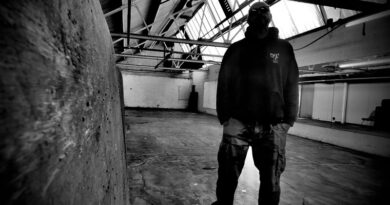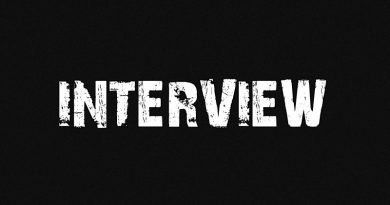Witch Mountain: Dave Bowes Chats To Drummer Nathan Carson As They Prepare To Hit The Road With Nik Turner
Things are somewhat crazy for Witch Mountain these days. Following the success of their stupendous third album Cauldron Of The Wild, the Portland doom merchants had slots at Roadburn and Hellfest, two European tours, and now they are about to drop their fourth album, although sadly their last to feature vocalist Uta Plotkin, the tortured blues-doom opus Mobile Of Angels. We managed to snag drummer Nathan Carson for a quick chat about mushrooms, Hawkwind and why doom fans are just big softies at heart.
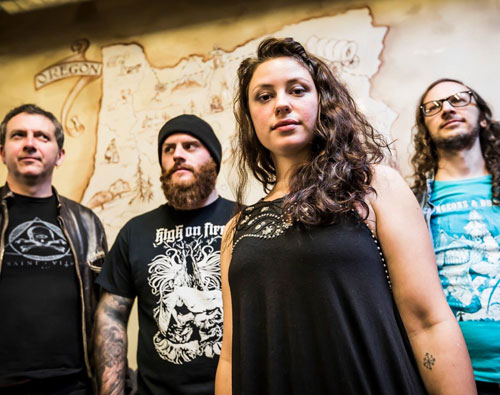
For the past couple of years, you’ve been touring quite heavily. I think those were your first European tours too. How did you find the experience?
It’s fantastic. We know the US very well, we’ve done it a lot, and I’m really excited for this next tour, especially for certain quality of life things like having our telephones work and having places to stay with our friends, knowing places that we want to eat at. But it’s always so exciting to get to go to Europe, discover other cultures and play in new places that we’ve never been; being in Iceland, when it’s 22 hours of daylight; being in Greece and getting incredible food and treatment. It’s always a treat for us to go over there and we look forward to it.
Did you struggle in any places in Europe, through lacking those home comforts?
No, I think we were pretty well taken care of the whole time. I think the biggest struggle was simply that touring in June is a very competitive time to be over. Because of the weather, the World Cup, and all the festivals and everything that are happening, I don’t think it was particularly good timing to be there this time around but what are you going to do when Hellfest says, “Come play?” You just do it.
So what’s happening with the band right now?
We are just about to leave for a full US and Canada tour supporting Nik Turner’s Hawkwind, so it’s going to be great. It’s going to be a really interesting mix of music. They’re doing a very classic psychedelic set and we’ll be doing what we do, and I think it’ll be very complementary. I think both bands will bring out a crowd as opposed to this last European tour which was a little bit lighter in attendance. We’re going to be playing to a lot of people this time around which is going to be nice.
Were Hawkwind much of an influence or you or the band?
I mean, I’ve had the Space Ritual LP since I was a kid so I’ve always liked them. I wouldn’t say it’s a profound influence on what we do, but Witch Mountain used to cover Lost Johnny about 12 years ago so it’s certainly been on our radar for a long time.
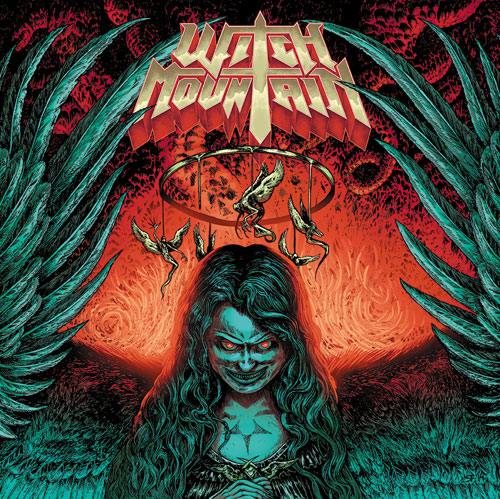
Going back to that period, could you say a little about how the band came to change and how Uta ended up joining the band? I know that the band had already built up quite a considerable reputation already by that point.
We had been looking for a singer for a really long time but we never found the right person so we never let it stop us. Our guitar player Rob sang on the demo, and on the first album, and on all those shows and tours for years and it was fine. Rob’s got a fine voice but ultimately he’s one of the truly great guitar players out there and we just thought he could focus on what he loves to do more if we had a singer. Also, in 2008, we kind of came to this point where we were really ready to finally get the South Of Salem album together. The songs had been written years before and we were just at a place in our lives where we were ready to take the band to another level and get more serious.
To me, that process was just to be better than we’d ever been. To really work hard on being as good as our contemporaries, because we’d watched bands like Yob and Agalloch, who used to open for us when they were first starting out here. We’d watched them race to these heights because they were releasing albums and touring and doing great work, and I just knew that we needed to be as good as our friends. Right around that time I put out a MySpace bulletin for my booking agency, Nanotear, that I was looking for an intern. Uta approached me because she said that she had a band and she wanted to learn more about booking tours, so for about a year we just worked together on booking shows. Then I went and saw her other band Aranya play and discovered that she had this really phenomenal voice. Witch Mountain had a show coming up with Pentagram and I invited her to learn a song, and she came out in front of 400 people and sang a tune with us and it just felt great. So we asked her if she’d learn a whole set of material, and she agreed to, so it was really just good timing for everyone. A very natural process.
It was with Cauldron Of The Wild that she became more of a part of the songwriting process, right?
Absolutely. South Of Salem was already written so aside from tweaking some lyrics on one of the songs, she mostly just came in, learned the music, did some gigs with us for six months, and then we went in and made that album. But then, as the next year went by, and we started touring and working together more and as the songs for Cauldron… were developing, we definitely encouraged her to write her own lyrics. Anyone will sing with more conviction if they’re singing words they wrote, and she’s an excellent lyricist on top of that, so that’s the first album where we got to show the world what Witch Mountain sounds like when we’re collaborating with Uta Plotkin and she’s coming up with her own melodies, her own words and ideas, and it brought a lot of those story songs like Lanky Rae and Aurelia. It just felt, like, “Wow!” Like we’d really stepped outside of just being a derivative doom metal band at that point, adding our own style to tradition. It just felt like a very original take on a very traditional style of music, and I think Mobile Of Angels is even more so.
I heard that the writing of the music for Shelter on Cauldron… basically involved a bag of ‘shrooms.
Yeah, that’s happened! That’s sometimes part of Rob’s writing process and that song came together a month before we recorded it, I think, and it still seems to be a fan favourite. We play Shelter almost every night on tour because people seem to really like it. It’s a cool song.
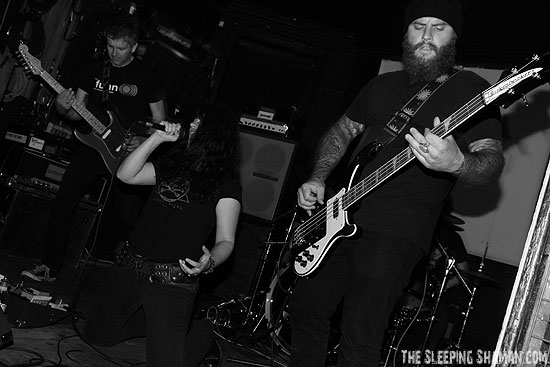
It’s the one song that I always go back to. It was basically my song of the year. Was there anything similar this time around or was it more focused?
I’d have to ask Rob. I know there was probably plenty of weed and beer involved. Whether or not he had ‘shrooms on any particular song or not, I’m not recalling, but he’s definitely happiest when he’s writing down in the basement with his guitar a bong and a beer. It definitely contributes. A lot of bands are offended to be called stoner rock but we’ve never shied away. We always just thought that was a given.
Makes sense. I was just wondering but what is your background and approach as a drummer?
I started on the triangle in kindergarten, actually, and when I was about ten, school band came about and I really wanted to play the clarinet but I had really bad allergies and couldn’t breathe right so they put me on the drums. I think about the women I’ve dated as an adult and I think as a clarinet player I probably would have had very different luck. So no regrets there!
I struggled through the public education system as far as music went. I had a lot of really crappy teachers. I really kept trying but I just didn’t like the formality of the music system. So when I was 16 I bought a drum kit and just started a band with my friends and I’ve never stopped. I’ve been in bands pretty much non-stop since I was a teenager, and I’ve done a lot of tours and made a lot of records and I am largely self-taught though every couple of years I’ll find a drummer who I like and respect and take a couple of lessons from them and then kind of take my time to let that settle in.
More than anything, I’m the kind of guy that just plays with people a lot, and often. That’s how I’ve continued to improve and get better – just by playing with people. I’m not really the guy who sits by himself and just does rudiments all day long. I really just like to make music, and I think that’s maybe why I’ve ended up with a bit more of an original style – because I never really learned other people’s songs that much. I don’t sight-read music off a stand.
I have a custom-made Maple drum set and I am really good at tuning them. In fact, I’ve gotten drafted to tune a lot of other bands. Agalloch, Spirit Caravan, and other bands that we’re friends with, or have toured with, often ask me to tune their drums for them because I have a really good ear for it. I’ve kind of tried to take the ‘Ringo Starr of doom’ approach – not be a flashy drummer, not do anything except serve the song, be solid and sound good. I think the hardest thing for this band was really getting a feel of how to keep the tempos slow and have that 6/8 swing. Not rush during a fill. It took many years but I feel like this last year is the first time where I’ve got the band telling me to speed up instead of slow down, so that feels good.
With Mobile Of Angels, you’re releasing on both Profound Lore and Svart, who had been putting out the vinyl presses of your albums in Europe. How is this arrangement working out for you?
Profound Lore is doing the North American CD and Svart is doing the European CD and LP, and for the vinyl in the States, we release it ourselves on our own label, so we are really, really thrilled to have such incredible partners and to not be caught in the web of some of these bigger labels. It’s really awesome to work with people we absolutely trust, and are personal friends with. I couldn’t be happier, and it’s not luck. It’s taken us 17 years to navigate to this place but we’re working with the exact labels that we want to, booking ourselves at home and managing ourselves, and we’ve got a great agent out of Germany for touring. All kinds of awesome publicity people are working right now, so it feels like we’ve got a hell of a team working with us, and it took a lot of hard work and heavy lifting to get here. Nobody wants to invest their time in you unless they can tell you’re really fucking serious and I think that after that long gap between the first record and the second record, I think we’ve proven in the last five years that we’re pretty serious.

I’ve been having a look at some interviews and everyone flags the whole ‘female-fronted doom’ thing but, to me at least, doom is one of the few genres where this really is a non-issue. Do you think that doom fans are maybe a bit more open, or less macho, than other metal fans?
I definitely think that doom metal in general is a less macho form of music. It’s less about speed and aggression and yeah, we find that there are definitely a lot more women around, a lot more couples that come to the shows together, and a lot of the guys that come are a little bit more sensitive, I think. Also, anyone that has an ear to listen to slower music like this generally has a better connection to classic rock and classic songwriting, and those are styles where it’s actually encouraged to have a good singer.
I think that if we were playing thrash or death metal or something, having someone so virtuosic on the mic stand wouldn’t be so important and might even be detrimental to the aggression, but not for this kind of music. Robert Plant’s a great singer and Brian Wilson’s a great singer, and Freddie Mercury, and the Judas Priest guy, Rob Halford – those are touchstones for us and to be able to have somebody take your song, and take it to that level, is just phenomenal. There’s so many times in practice where we’ll hear what Uta’s come up with for the very first time and Rob and I will get tears in our eyes because it takes the music to a whole other level.
A lot of people respond to that and some don’t. I’ve heard some people gripe that they don’t like the sound of a woman’s voice or they think that Uta’s a bit too good at what she does, and I just think that you can’t please everyone and we certainly didn’t start playing doom metal back in the 90s planning to please many people at all, because it was a very unpopular style of music at that time. We did it because we loved it and because we didn’t care what came of it.
How much do you feel that the attitude towards doom has changed, say, in the last 10 years? Even just in Portland, where it seems pretty huge now.
Yeah, well it’s become so much more accepted. When we started, we were the only band here and so we played with punk bands, we played with rock and roll bands, we played with heavy metal bands, but the only times we had the opportunity to play with bands who were remotely like us was when bands came through on tour, and so we played the very first High On Fire show in Portland, the first Electric Wizard show in Portland, the first Orange Goblin show in Portland, and often times these bands would sleep on our floor after the show because we were the Portland guys, and that was the circuit. It is really interesting now to see Portland where there’re 15 or 20 doom bands of varying quality kicking around, and I think it’s great that it’s so much more accepted. I do get the impression that people sometimes feel like it’s an easier style of music to play but I would just say it’s easy to play badly. I feel like it took me years to get a really good handle on it but now I get a lot of compliments on it from sound guys and other musicians. It feels great but it was a hard-won battle. It took a long time.
You guys have described yourselves as ‘traditional American doom’. Is doom a style that’s particularly well-suited for conveying a sense of nationality or environment?
I think you can take your local culture and filter it through any genre or media if you want to. I guess what we mean by that is we have this real connection to the blues, to Jimi Hendrix, and ZZ Top. A lot of very iconic American bands, whereas someone like My Dying Bride, or Anathema or Candlemass, has a much more European flair to it. As much as we love and worship Candlemass, and they’ve certainly influenced us, they have a lot less of the blues in their version of doom than we do. We don’t want to be an American band that’s trying to rip off Swedish or British bands. I think we’re really trying to infuse our music with some of our own culture and it sounds obvious to me.
Well, thanks for that, Nathan. Do you have any final words you’d like to add?
Well, I just really appreciate you taking the time to check in with us. I appreciate it, and I’m looking forward to getting back over there.
Band Links: Official | Facebook | Bandcamp | Twitter
Interviewed by: Dave Bowes


